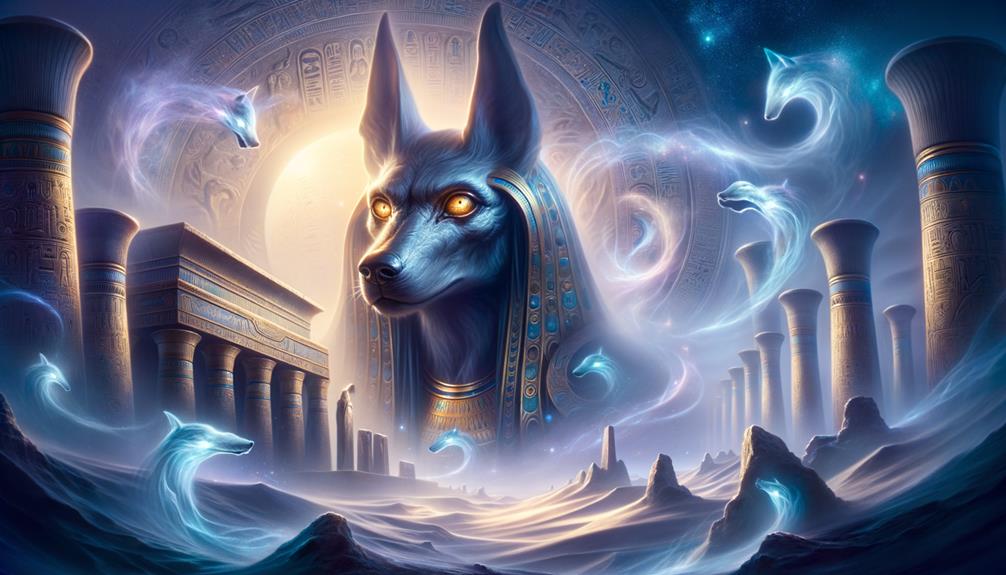Anubis, the Egyptian deity, has an intriguing role, serving as the protector and guide to the afterlife. His responsibilities include guiding souls to the afterlife and measuring hearts against the feather of truth from Maat, which plays a critical role in determining their destiny. His introduction of embalming and influence on burial practices reshaped how Egyptians view death. As the custodian of graves, he's deeply connected with beliefs about life and death. His influence even extends to contemporary culture, with appearances in films and video games, demonstrating his lasting appeal. For those curious about the ancient Egyptian afterlife, there's more to learn about this complex deity.
Historical Significance of Anubis
Let's chat about Anubis, a really standout figure in ancient Egyptian lore. Besides his memorable jackal-headed image, Anubis was seen as the guardian of the deceased and the one who led souls into the afterlife.
The people of ancient Egypt had a lot of respect for Anubis. He was seen as the protector of lost souls, a belief that really shows their views on mortality and the existence of an afterlife.
But Anubis wasn't just a guide. He also played a role in deciding the fate of souls in the afterlife. You see, he'd weigh the hearts of the dead against Maat's feather of truth – a real symbol of their belief in divine judgement. So, Anubis was not just a guide, but also a judge, really emphasizing his crucial role in ancient Egyptian beliefs.
Anubiss Role in Embalming
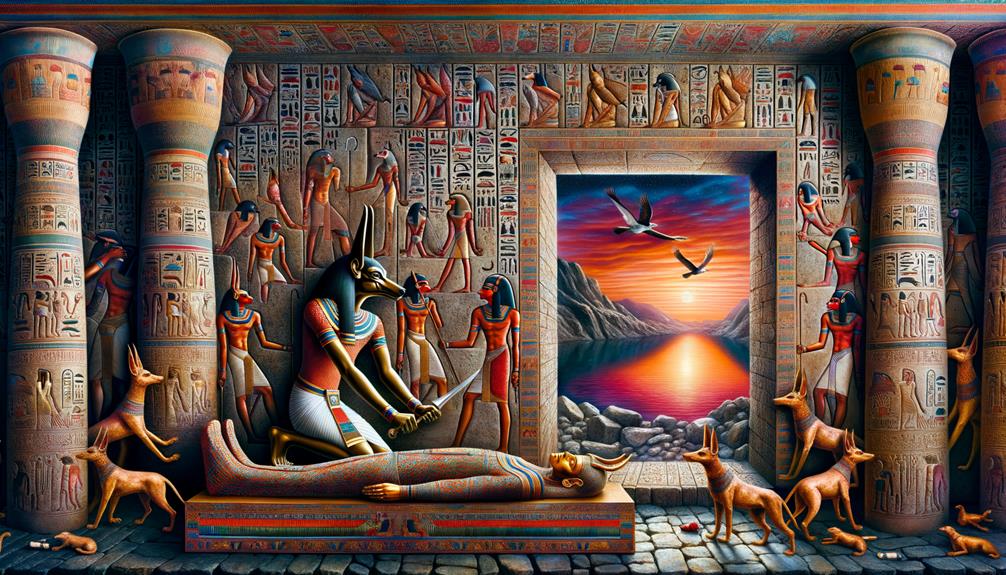
Let's chat about Anubis and his role in embalming, which was a central part of ancient Egyptian funeral rituals. It's commonly believed that Anubis himself started this practice. The story goes that Osiris, a key god in Egyptian mythology, was the first to receive this embalming treatment from Anubis.
Embalming was a vital step towards mummification, which was necessary for the preservation of the body for the afterlife. Anubis was the guy who put this process on the map, hugely influencing how the Egyptians thought about death and life after death. His stamp could be seen on every detail of the embalming process, showing off his skills and knowledge. That's why he was considered the go-to god for embalmers, marking his importance in looking after the dead.
Compared to other gods of his time, Anubis was pretty unique, thanks to his connection with embalming and mummification. He was a symbol of innovation, preservation, and respect for the dead, values that mattered a lot in ancient Egyptian culture. When we look at Anubis's involvement in embalming, we see why he was respected not just as a guardian of the afterlife but also as a trailblazer in the respectful care of the deceased.
Guardian of Tombs: Anubis
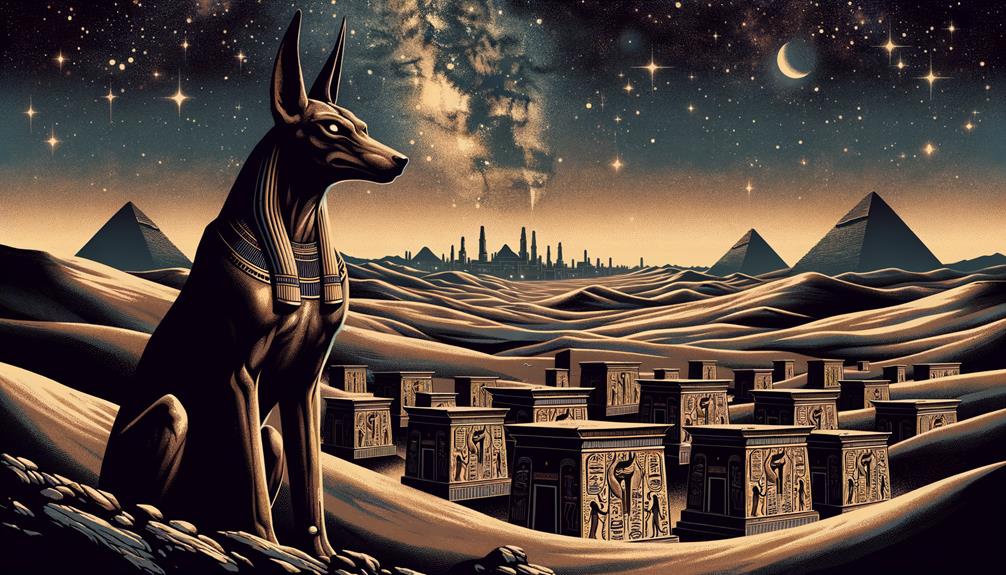
Anubis wasn't just the guy who prepared your body for the afterlife. He had a whole other side gig going on as the keeper of graves and burial grounds. This extra responsibility added more weight to his work in guiding souls to their next journey. Anubis, our jackal-headed Egyptian deity, served as the bodyguard of the dead, keeping them safe from grave robbers and making sure their transition to the afterlife went smoothly.
His participation in the mummification process wasn't just hands-on, but also held a deeper meaning. He often appeared in depictions working on the mummy, representing his job as the guardian in the afterlife. His influence was felt not just in the burial chambers, but also in the rituals carried out to pay respect to the dead.
Take the 'Opening of the Mouth' ceremony, for instance. This ritual, conducted before the body was laid to rest, was believed to bring back the deceased's senses in the afterlife. This further emphasized Anubis' commitment to those who passed away. During this ritual, priests would wear leopard skins, a nod to Anubis' triumph over Set, symbolizing his protective nature.
To sum it up, Anubis' duties weren't limited to just creating mummies. He was the guardian of graves and a key figure in ancient Egypt's approach to death and dying.
Anubis as the Guide of Souls
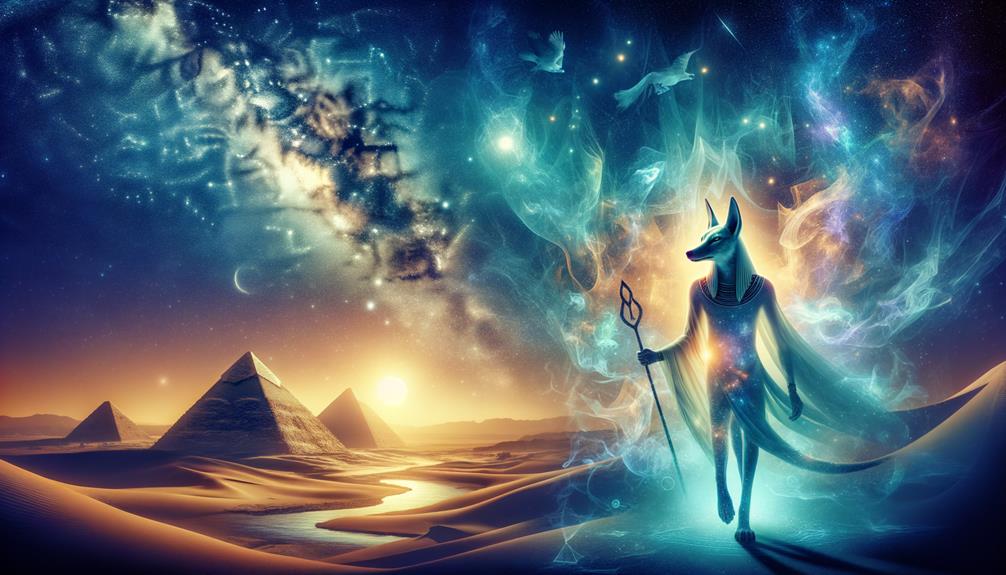
Anubis wasn't just a protector; he had another crucial job. He was the one who took souls by the hand and showed them the way from the world of the living to the afterlife. This job might remind you of the Greek god Hermes, who had a similar role. Anubis, known as the 'Lord of the Sacred Land,' was deeply intertwined with the ancient Egyptian ideas about life, death, and what comes after. He wasn't just standing by; he was the one leading souls on their journey to the afterlife, a role you might call a psychopomp.
If you ever get the chance to look at funerary art from ancient Egypt, you'll often see Anubis guiding people, sometimes even dressed in Greek clothes, towards Osiris, who was the big boss of the underworld. These images underline Anubis's job as the soul's guide, and they show just how crucial he was in the rituals and practices around death in ancient Egypt. But it wasn't just about death itself. It was about the journey to it, and the transition into the underworld.
When you think about Anubis as the guide of souls, he becomes a symbol for the journey of the deceased into the land of the dead. This role really highlights his importance in ancient Egyptian mythology and their ideas about life, death, and the afterlife.
Anubis in Modern Popular Culture
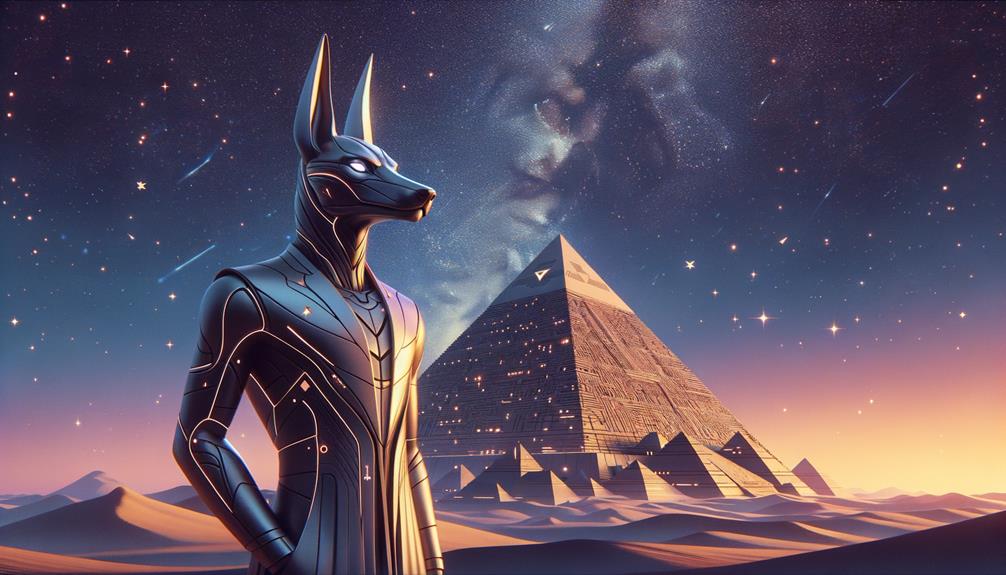
Anubis, the ancient Egyptian God of Death, is not just a figure from the history books. This jackal-headed deity, known for his role as the guide of souls and the protector of the dead, is still making his mark today. You'll see him featured in all sorts of places in contemporary popular culture, from movies and video games to books.
Anubis's unique and intriguing character is a big hit in various forms of media. His association with death, mummification and the afterlife, symbolized by his iconic appearance, is often used to add depth and intrigue to storylines.
Here's a quick look at some of the modern platforms where Anubis has made an appearance:
| Medium | Title/Example |
|---|---|
| Movies | The Mummy Returns |
| Video Games | Assassin's Creed Origins |
| Books | The Kane Chronicles |
These instances show that Anubis, once a patron god of Ancient Egypt, is still a key figure in today's media. His mythology and symbolism are still stirring interest and giving us a fascinating peek into the practices and beliefs of the ancient world.
Frequently Asked Questions
What Is Anubis the Guardian Of?
So, you're curious about Anubis? Well, in the realm of ancient mythology, think of him as a cosmic lifeguard, if you will. His job? To watch over and guide the spirits of those who have passed away as they journey through the intricate labyrinth of the afterlife.
Who Is the Egyptian Guardian of Death?
Sure thing, let's chat about this. You know, the one who's been appointed as the guardian of death in Egyptian mythology is none other than Anubis. His job description? Pretty intense. He's got the responsibility of escorting souls into what comes next – the afterlife. And it doesn't stop there. He also supervises the mummification process, which as you can imagine, is a delicate task. Plus, he's the one who keeps tombs safe, ensuring a serene voyage for those who have passed on. Quite the role, wouldn't you agree?
What Role Did Anubis Play in the Afterlife?
In the intricate workings of the afterlife, my role was akin to a navigator and adjudicator. I had the responsibility of weighing the hearts of the departed against a feather. This practice was a way of deciding their destiny, symbolizing fairness and ethics in ancient Egyptian spiritual practices.
How Did Anubis Protect the Dead?
As Anubis, my role is to act as a guardian for those who have passed away. This involves supervising the process of mummification and serving as a guide for their spirits in the afterlife. But that's not all – I also have the responsibility of looking after their burial sites and weighing their hearts against the feather of truth, which helps decide their destiny.

